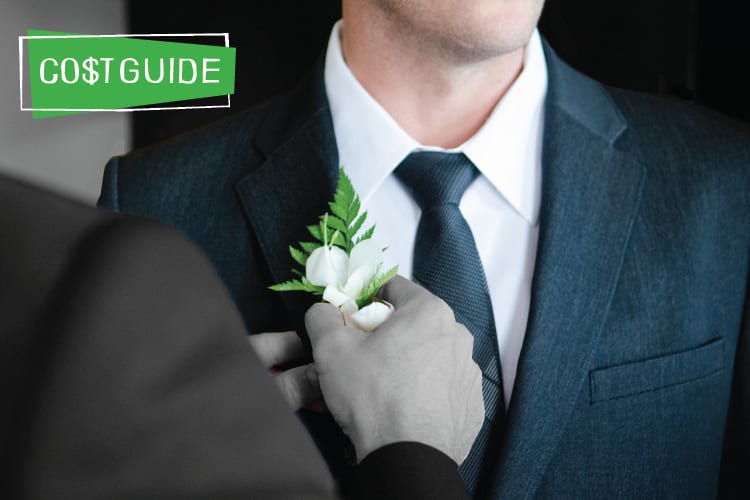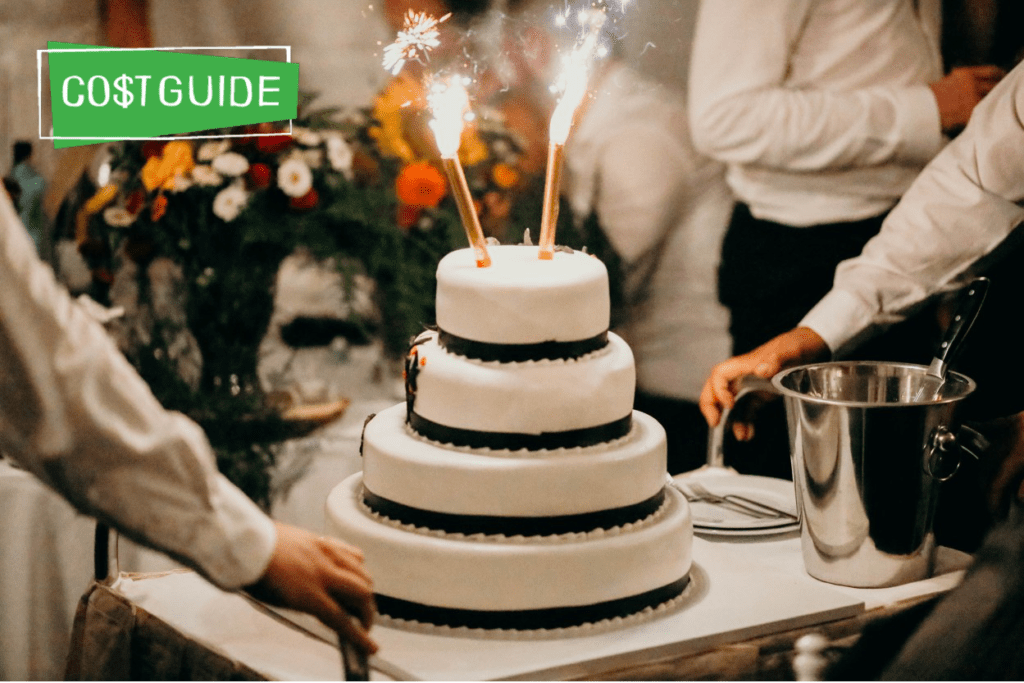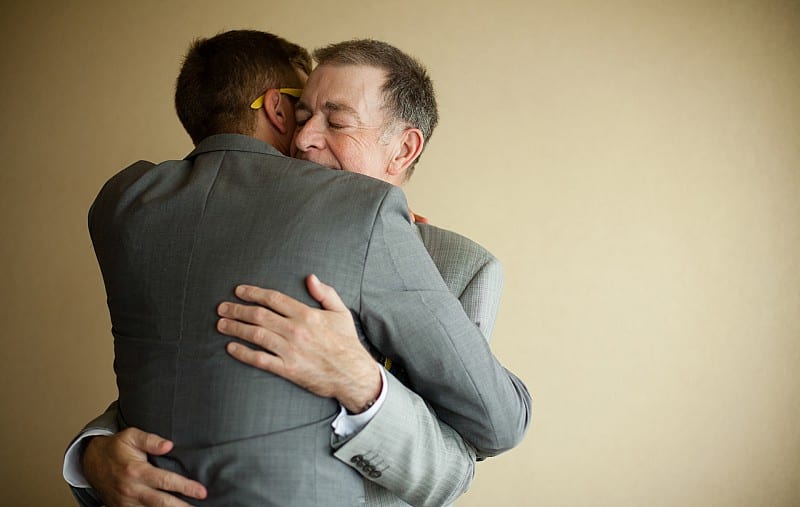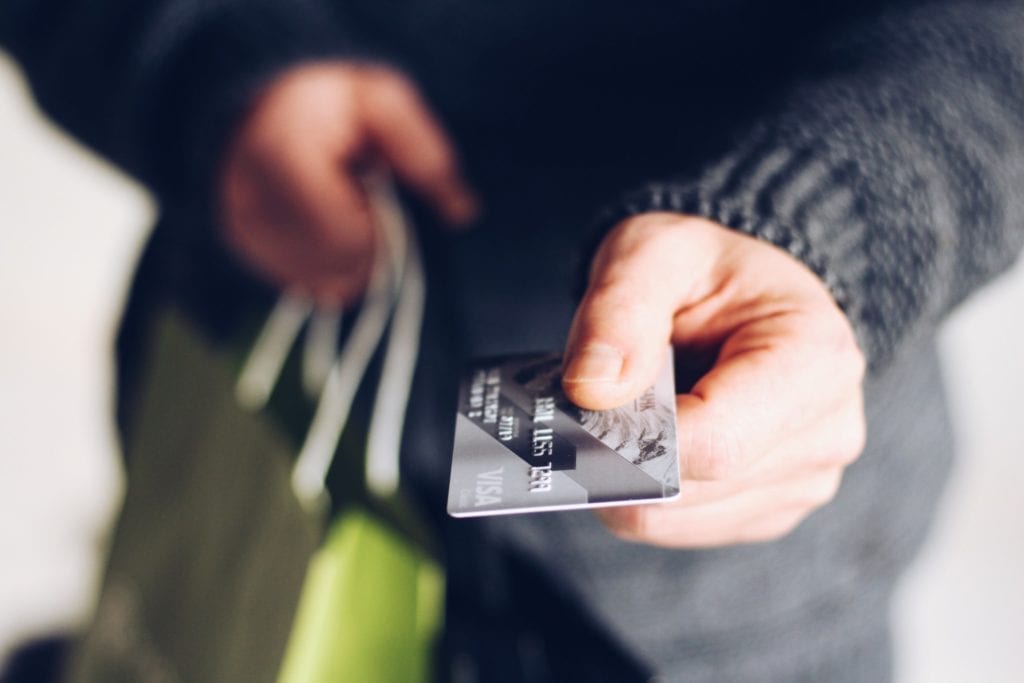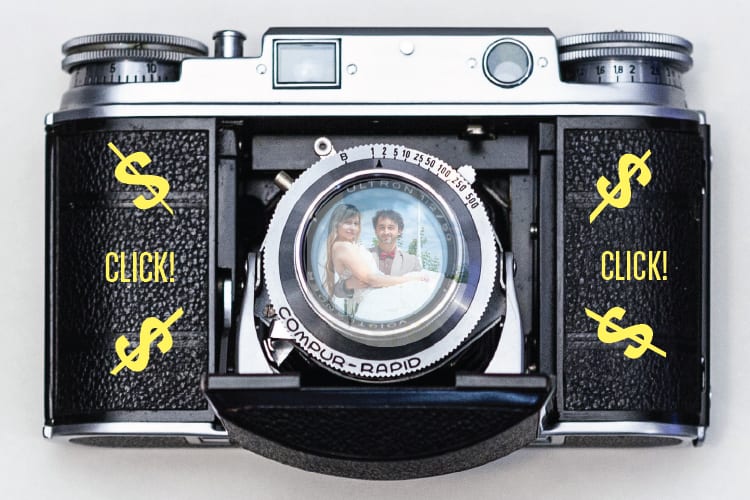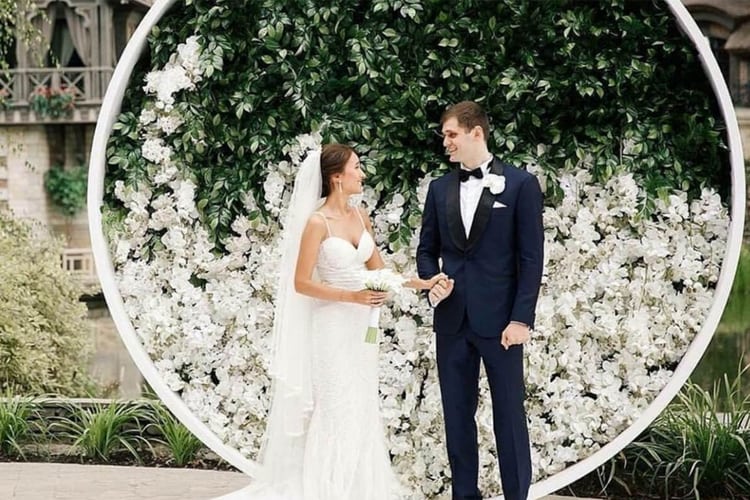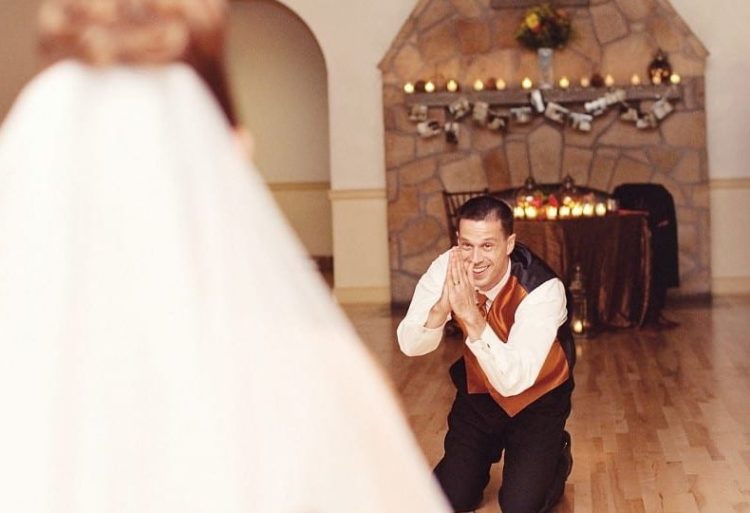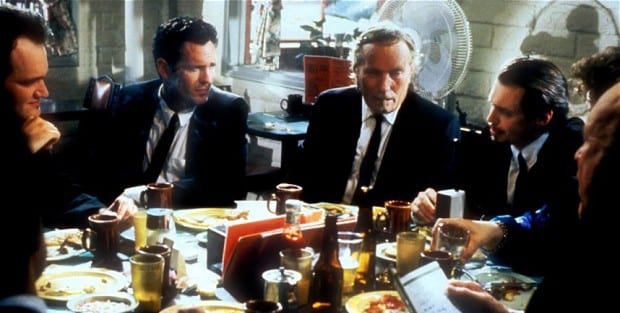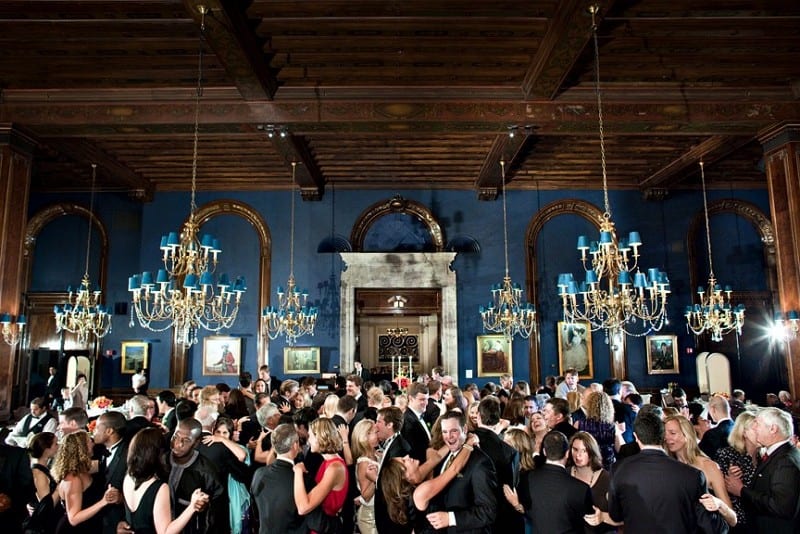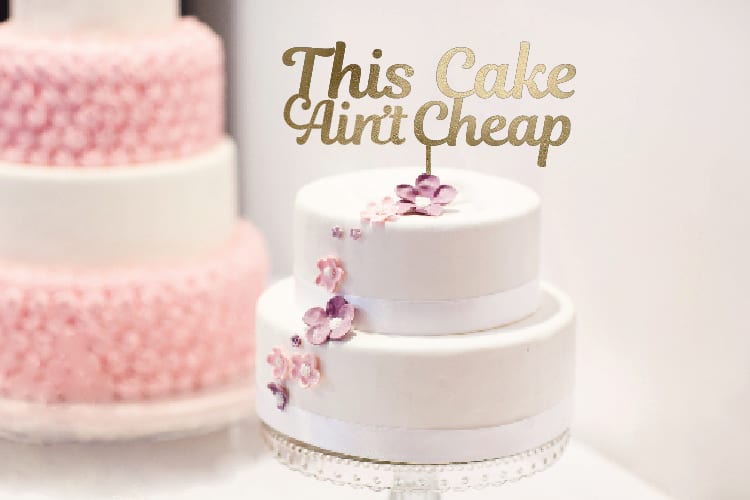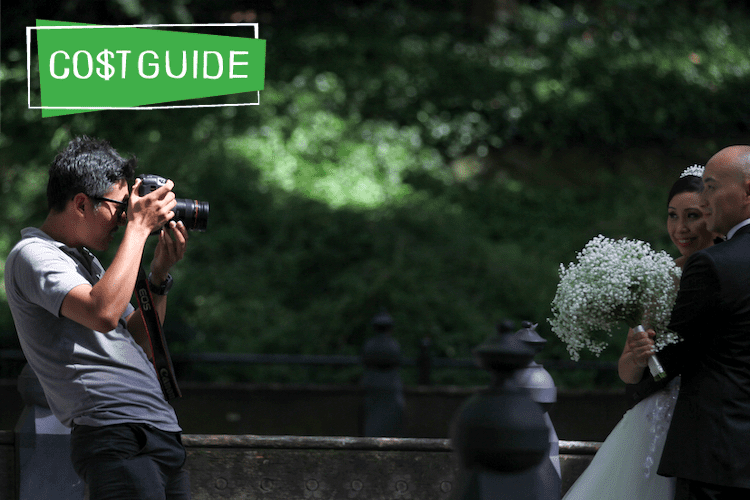
Expect to pay anywhere from $500 to $5,000 for a wedding photographer, though the sweet spot in an average American city seems to be about $3,000 for a seven- to eight-hour shoot day with a second shooter. At the highest end, you’re dealing with truly exorbitant rates that are more like daylong professional modeling sessions than typical wedding photography — famed wedding photographer (and lighting-equipment inventor) Gary Fong charged a day rate of over $120,000 for weddings.
What You Should Ask A Photographer Before Hiring
Do You Shoot Digital Or Film?
Most wedding photographers shoot digital for the convenience and ubiquity of the format, but an old-school photographer may still rely on film. If you do opt for a film photographer, make sure he/she can do the developing too. Since it’s an increasingly lost art, you may pay more for a film shooter, there won’t be a digital copy, and and it’ll take longer for you to get your prints (it takes longer to develop and edit the images, and they can’t simply email you a link to a cloud-storage file).
How Much Experience Do You Have Shooting Weddings?
It doesn’t matter if she’s an award-winning warfront photojournalist; weddings are an entirely different beast than nearly any other photography job, requiring not just the obvious technical skills but also an impeccable sense of timing and the diplomatic skills of a UN envoy. Hire someone who’s shot several weddings — you don’t want your wedding day to be a newbie’s trial outing.
Can I See A Wedding Portfolio?
This is the best way for you to judge whether the photographer’s skill level and style (documentary, portrait, etc.) are appropriate for you and your partner. If a photographer won’t show you her portfolio, do not hire her.
Will You Need A Second Shooter Or Assistant?
Unless your wedding is going to be on the smaller side (under, say, 100 people), you’ll probably want a second shooter-slash-assistant on hand to help the main photographer and ensure they get all the important angles during important events of the night, like the first dance and the ceremony. The price will jump by as much as 50 percent, but it’s usually worth it. You’ll even want to consider it if you do have a smaller wedding, and some photographers simply won’t shoot weddings without a helper. The photographer will hire her assistant — it’s not something for you to arrange.
Do You Have Insurance?
Accidents happen, especially when guests are drinking and fragile but expensive camera and lighting equipment is lying around.
What Will You Shoot At Our Wedding?
Make sure the photographer knows exactly what you expect of her. A typical shooting day for a wedding includes images of the bridal party getting ready, the ceremony itself, shots of the guests enjoying themselves throughout, group shots of the families and the guests, bride-and-groom shots and the “grand exit” of the newlyweds. (Often, the exit will be staged earlier in the day so that the photographer doesn’t have to stick around till the wee hours and the couple don’t have to pay for the extra hours.)
Do You Do Drone Photography?
Yep, this is now a wedding thing. Expect to pay a hefty extra (assume anywhere from $800 to $4,000 for an average-length wedding for photo and video, though prices vary wildly for the new industry) for those perfect aerial shots of your outdoor wedding. Make sure your photographer is aware of and will handle the necessary permitting (you can’t legally use a drone everywhere in the US or abroad).
What Can We Share?
The photos the photographer takes are legally her intellectual property — she owns the copyright by virtue of having been the person who clicked the button. Wedding photographers rarely have an issue with you sharing your wedding pictures with friends and family, but you’ll want to suss out whether or not they’ll have a problem with anything grander. (She’ll probably want a cut and credit if your wedding-cake photo is going to be the logo of your couples-therapy business, for example.) Likewise, if you won’t want the photographer using your wedding photos in her portfolio or to advertise her business, be clear about that as soon as possible. And if the photographer tends to plaster her logo on the corners of her pictures, now’s the time to tell her you’d prefer she didn’t add those to your wedding shots.
What About The Contract?
As with any business transaction involving a larger sum of money, you should insist on a formal, signed contract that lays out what you expect in return for your payment. And consider it a red flag if the photographer doesn’t ask for one — the contract protects her, as well, and if she tries to wave it off, it’s a sign that she’s either not a professional or that she’s afraid of committing
What You Will Get
Several hours of a photographer following you around: Typically anywhere from four to eight hours.
Several weeks of waiting: It takes time to make you and all your guests glow just right. Expect editing (also known as post production or retouching) to take up to eight weeks — possibly more for film. Good photographers care how their product looks; they don’t just upload the shoot and walk away.
A thumb drive: The photographer will usually select the best photos from the wedding day, edit them and send them to you on a USB drive (if shooting digital).
Physical prints: Whether your photographer is shooting film or digital, you’re probably going to get prints of the wedding as well. You’ll negotiate the sizes, number of prints and frames with the photographer beforehand. Extra copies of that shot where you actually look handsome will cost more.
A physical album (optional): They’re getting rarer in this day of JPEG slideshows, but most photographers will offer to make you a physical wedding album, if you want. In most cases, you’ll be able to use the image files to make your own album from a third-party company later, too.
A refund, if necessary: If the unforeseeable happens and all the shots are lost, you should get either a full refund from the photographer or an offer to restage and reshoot elements of the wedding (along with a partial refund). Don’t demand your money back simply because you were unhappy with the way your hair looked in the photos — that’s not the photographer’s fault.
What photographers will expect from you
A meal: Your photographer will be spending all day with you, and will need and expect meals with that. Normally, she and her assistants would just be considered additional heads for the catering tally. If you’re considering giving her a meal “per diem” (stipend) instead, remember that the time your photographer has to spend leaving the venue and grabbing even a quick bite to eat is precious time she’ll be away from your wedding party, possibly missing once-in-a-lifetime moments you hired her to memorialize. Better to let her take her meal break on site with the other guests.
Traveling expenses (possibly): If the photographer is going to be driving an hour or more to get to your venue, expect to pay for travel expenses (rates run anywhere from 50 cents to $2 per mile, but each photographer will have her own method of determining this). If your wedding is far enough that the photographer will have to fly, you’ll be responsible for her airfare, hotel room and related incidentals like car rentals or taxis, as well as for that of second shooters and assistants.
A tip: Anyone who provides you a personal service for your wedding will expect a tip, including the photographer. A good tip is 18 to 20 percent of the contracted price of her services.
Is the photographer the same as a videographer?
Definitely not. It’s hard enough shooting still images amid the chaos of a wedding, and videography is a different skill altogether. Expecting one team to handle both photography and videography is unrealistic, and bound to return mediocre results on both ends. Hire a videographer separately. If someone claims she can be both the photographer and the videographer for your wedding, you should seriously consider finding other people to handle those tasks.
The Biggest Mistake People Make:
Hiring a friend to shoot your wedding. Though it sounds like a great way to save thousands — after all, an inebriated baboon could take great pictures with cell-phone cameras these days, right? — we highly advise against this, unless your friend is an actual professional wedding photographer. (And now that you know how much those cost, consider it an extremely generous wedding gift if your professional wedding photographer friend offers to shoot your special day gratis.) Instead of well-posed, technically adroit photos that capture the most special day of your life and help you memorialize it forever, you’re very likely to end up with blurry images, poor lighting, critical moments where the focus is on the corner of the table instead of the bride, questionable shot choices (did we really need to see your frat brothers doing tequila shots in the kitchen while the bride was throwing the bouquet?) and, all in all, photographs more worthy of a Facebook album than a wedding album.
That said, if for some reason you have to rely on an amateur photographer, hold several meetings with her before the wedding day and be crystal clear about what you want her to do and what photographs you expect to see (a shot list). If you’ve hired a wedding planner, delegate the planner to be the unofficial boss of the photographer, and make sure the planner knows to supervise and direct which events must be covered.







